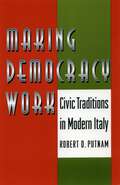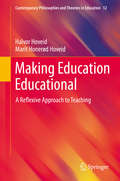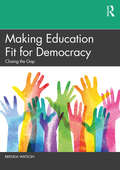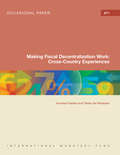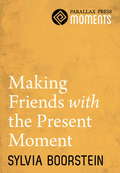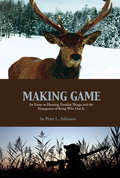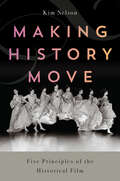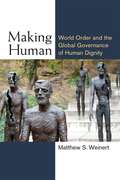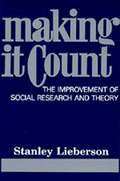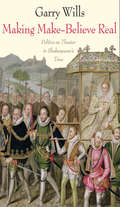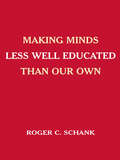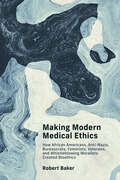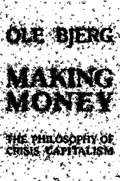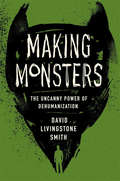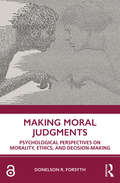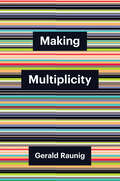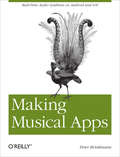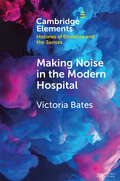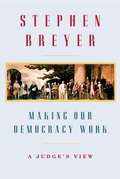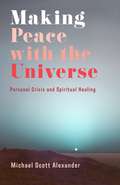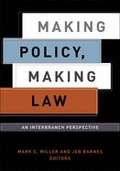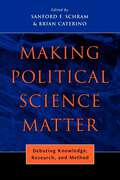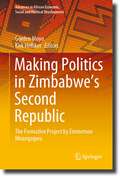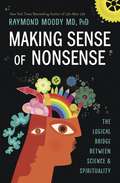- Table View
- List View
Making Constitutions
by Gabriel L. NegrettoNegretto provides the first systematic explanation of the origins of constitutional designs from an analytical, historical and comparative perspective. Based on analysis of constitutional change in Latin America from 1900 to 2008 and four detailed case studies, Negretto shows the main determinants of constitutional choice are the past performance of constitutions in providing effective and legitimate instruments of government and the strategic interests of the actors who have influence over institutional selection. The book explains how governance problems shape the general guidelines for reform, while strategic calculations and power resources affect the selection of specific alternatives of design. It emphasizes the importance of events that trigger reform and the designers' level of electoral uncertainty for understanding the relative impact of short-term partisan interests on constitution writing. Negretto's study challenges predominant theories of institutional choice and paves the way for the development of a new research agenda on institutional change.
Making Democracy Work: Civic Traditions in Modern Italy
by Robert D. Putnam Robert Leonardi Raffaella Y. NanettiWhy do some democratic governments succeed and others fail? In a book that has received attention from policymakers and civic activists in America and around the world, Robert Putnam and his collaborators offer empirical evidence for the importance of "civic community" in developing successful institutions. Their focus is on a unique experiment begun in 1970 when Italy created new governments for each of its regions. After spending two decades analyzing the efficacy of these governments in such fields as agriculture, housing, and health services, they reveal patterns of associationism, trust, and cooperation that facilitate good governance and economic prosperity.
Making Education Educational: A Reflexive Approach to Teaching (Contemporary Philosophies and Theories in Education #12)
by Halvor Hoveid Marit Honerød HoveidThis book is an argument for reflexivity in the act of teaching, which means to acknowledge that intention guides the act of teaching. Teaching must create attention towards processes of collectivity in the classroom. Today, teaching is both acts of expressing knowledge and acts of securing justice to all students through a mediation of knowledge. Teaching therefore expresses both knowledge with reference to school subjects, and justice according to the distribution of this knowledge.The authors argue for teaching as the driver of education. To pay attention to teaching is to pay attention to that which is inside the system of education. To consider education as a mediation of knowledge between generations, places teaching as an act of performing the content of education, in a class in a school. The complexity of these processes is easily overlooked when education is used as a means in competitive economies. The approach taken in this text is that deliberations about teaching must be based on historicity. The support for this argument builds on a reading of the French philosopher Paul Ricoeur.The book addresses teaching as an integral part of the learning process. In education today, everything seems to be concentrated around learning, as if teaching no longer takes place. Teachers and teacher educators need a language to discuss and understand teaching, both as personal and institutional actions. A Ricoeurian approach to a discussion on teaching as a reflexive and institutional practice, provides a timely approach to important questions related to teaching in our day and age.
Making Education Fit for Democracy: Closing the Gap
by Brenda WatsonDewey wrote his celebrated book on Democracy and Education over a hundred years ago. Making Education Fit for Democracy asks why education has nevertheless failed to deliver such crucial support for democracy and how it should change to reflect ethical and social responsibilities. It seeks to shed light on what has gone wrong and how it can be put right. Reforming an antiquated system of education should be a matter for public debate. This book is written not only for those currently involved in delivering education, but also for the general public. Arguing that education needs to be holistic, encouraging open-mindedness and developing a wide range of interests, it: Highlights the role of education in supporting democracy Promotes nurture in civilising values over mere information-giving Puts exams and accountability into perspective Seeks to bridge the gulf between schooling and life Argues for the reform of the whole system of education Seeks to use digital technology to personalise education Touching upon several issues currently under debate, such as the rise of populism, the role of religion and narrow subject curriculum, this book will be of interest to all students studying education as well as those involved in teacher education.
Making Fiscal Decentralization Work: Cross-Country Experiences
by Annalisa Fedelino Teresa Ter-MinassianThe question of what makes fiscal decentralization work is faced by many policymakers around the world. This book draws on both the relevant literature and policy and technical advice provided by the IMF to a wide range of member countries, and discusses the key factors that help make decentralization sustainable, efficient, and equitable from a macroeconomic perspective. It focuses on institutional reforms (in the revenue and expenditure assignments to different levels of government, the design of intergovernmental transfers, and public financial management systems) that are suited to different countries' circumstances, and their appropriate sequencing.
Making Friends with the Present Moment
by Sylvia BoorsteinTaken from Sylvia Boorstein's influential contribution to Solid Ground , Boorstein invites readers to see things exactly the way they are, no matter how difficult.
Making Game: An Essay on Hunting, Familiar Things, and the Strangeness of Being Who One Is
by Peter L. AtkinsonMaking Game is a mixed-genre composition in which the author reflects on the philosophical and ethical implications of hunting wild game. This engaging essay is informed by the author’s significant background of scholarly engagement with the phenomenological tradition in modern philosophy.
Making History Move: Five Principles of the Historical Film
by Kim NelsonMaking History Move: Five Principles of the Historical Film builds upon decades of scholarship investigating history in visual culture by proposing a methodology of five principles to analyze history in moving images in the digital age. It charts a path to understanding the form of history with the most significant impact on public perceptions of the past. The book develops insights across these fields, including philosophical considerations of film and history, to clarify the form and function of history in moving images. It addresses the implications of the historical film on public historical consciousness, presenting criteria to engage and assess the truth status of depictions of the past. Each chapter offers a detailed aspect of this methodology for analyzing history in moving images. Together, they propose five principles to organize past and future scholarship in this vital, interdisciplinary field of study.
Making Human: World Order And The Global Governance Of Human Dignity
by Matthew S. WeinertDifferences between human beings have long been used to justify a range of degrading, exclusionary, and murderous practices that strip people of their humanity and dignity. While considerable scholarship has been devoted to such dehumanization, Matthew S. Weinert asks how we might conceive its reverse--humanization, or what it means to "make human. " Weinert proposes an account of making human centered on five mechanisms: reflection, recognition, resistance, replication of dominant mores, and responsibility. Examining cases such as the UN Security Council's engagements with crises and the International Court of Justice's grappling with Kosovo's unilateral declaration of independence, he illustrates the distinct and contingent ways these mechanisms have been deployed. Theoretically, the cases evince a complex, evolving relationship between state-centric and human-centric views of society, ultimately revealing the normative potentialities of both. Though the case studies concern specific human relations issues on an international level, Weinert argues in favor of starting from the shared problem of being human and of living in a world in which the humanity of countless groups has been demeaned or denied. Working outward from that point, he proposes, we obtain a more pragmatically grounded understanding of the social construction of the human being.
Making It Count: The Improvement of Social Research and Theory
by Stanley LiebersonThere were many failures before humans successfully learned to fly. After watching birds flap their wings, bold and adventurous individuals built huge winglike structures, leaped off cliffs, flapped their wings vigorously, and broke their necks. There are principles of flight to be learned from watching the birds all right, but the wrong analogy had been drawn. In similar fashion, our empirical approach to social behavior is based on an analogy.
Making Make-Believe Real
by Garry WillsShakespeare's plays abound with kings and leaders who crave a public stage and seize every opportunity to make their lives a performance: Antony, Cleopatra, Richard III, Othello, and many others. Such self-dramatizing characters appear in the work of other playwrights of the era as well, Marlowe's Edward II and Tamburlaine among them. But Elizabethan playwrights were not alone in realizing that a sense of theater was essential to the exercise of power. Real rulers knew it, too, and none better than Queen Elizabeth. In this fascinating study of political stagecraft in the Elizabethan era, Garry Wills explores a period of vast cultural and political change during which the power of make-believe to make power real was not just a theory but an essential truth. Wills examines English culture as Catholic Christianity's rituals were being overturned and a Protestant queen took the throne. New iconographies of power were necessary for the new Renaissance liturgy to displace the medieval church-state. The author illuminates the extensive imaginative constructions that went into Elizabeth's reign and the explosion of great Tudor and Stuart drama that provided the imaginative power to support her long and successful rule.
Making Minds Less Well Educated Than Our Own
by Roger C. SchankIn the author's words: "This book is an honest attempt to understand what it means to be educated in today's world." His argument is this: No matter how important science and technology seem to industry or government or indeed to the daily life of people, as a society we believe that those educated in literature, history, and other humanities are in some way better informed, more knowing, and somehow more worthy of the descriptor "well educated." This 19th-century conception of the educated mind weighs heavily on our notions on how we educate our young. When we focus on intellectual and scholarly issues in high school as opposed to issues, such as communications, basic psychology, or child raising, we are continuing to rely on outdated notions of the educated mind that come from elitist notions of who is to be educated and what that means. To accommodate the realities of today's world it is necessary to change these elitist notions. We need to rethink what it means to be educated and begin to focus on a new conception of the very idea of education. Students need to learn how to think, not how to accomplish tasks, such as passing standardized tests and reciting rote facts. In this engaging book, Roger C. Schank sets forth the premises of his argument, cites its foundations in the Great Books themselves, and illustrates it with examples from an experimental curriculum that has been used in graduate schools and with K-12 students. Making Minds Less Well Educated Than Our Own is essential reading for scholars and students in the learning sciences, instructional design, curriculum theory and planning, educational policy, school reform, philosophy of education, higher education, and anyone interested in what it means to be educated in today's world.
Making Modern Medical Ethics: How African Americans, Anti-Nazis, Bureaucrats, Feminists, Veterans, and Whistleblowing Moralists Created Bioethics (Basic Bioethics)
by Robert BakerThe little-known stories of the people responsible for what we know today as modern medical ethics.In Making Modern Medical Ethics, Robert Baker tells the counter history of the birth of bioethics, bringing to the fore the stories of the dissenters and whistleblowers who challenged the establishment. Drawing on his earlier work on moral revolutions and the history of medical ethics, Robert Baker traces the history of modern medical ethics and its bioethical turn to the moral insurrections incited by the many unsung dissenters and whistleblowers: African American civil rights leaders, Jewish Americans harboring Holocaust memories, feminists, women, and Anglo-American physicians and healthcare professionals who were veterans of the World Wars, the Cold War, and the Vietnam War.The standard narrative for bioethics typically emphasizes the morally disruptive medical technologies of the latter part of the twentieth century, such as the dialysis machine, the electroencephalograph, and the ventilator, as they created the need to reconsider traditional notions of medical ethics. Baker, however, tells a fresh narrative, one that has historically been neglected (e.g., the story of the medical veterans who founded an international medical organization to rescue medicine and biomedical research from the scandal of Nazi medicine), and also reveals the penalties that moral change agents paid (e.g., the stubborn bureaucrat who was demoted for her insistence on requiring and enforcing research subjects&’ informed consent). Analyzing major statements of modern medical ethics from the 1946–1947 Nuremberg Doctors Trials and Nuremberg Code to A Patient&’s Bill of Rights, Making Modern Medical Ethics is a winning history of just how respect and autonomy for patients and research subjects came to be codified.
Making Money
by Ole BjergWhat is money? Where does it come from? Who makes our money today? And how can we understand the current state of our economy as a crisis of money itself? In Making Money, Ole Bjerg turns these questions into a matter of philosophical rather than economic analysis. Using the thinking of Slavoj i ek, while still engaging with mainstream economic literature, the book provides a genuinely philosophical theory of money. This theory is unfolded in reflections on the nature of monetary phenomenon such as financial markets, banks, debt, credit, derivatives, gold, risk, value, price, interests, and arbitrage. The analysis of money is put into an historical context by suggesting that the current financial turbulence and debt crisis are symptoms that we live in the age of post-credit capitalism. By bridging the fields of economics and contemporary philosophy, Bjerg's work engages in a productive form of intellectual arbitrage.From the Trade Paperback edition.
Making Monsters: The Uncanny Power of Dehumanization
by David Livingstone SmithA leading scholar explores what it means to dehumanize others—and how and why we do it. “I wouldn’t have accepted that they were human beings. You would see an infant who’s just learning to smile, and it smiles at you, but you still kill it.” So a Hutu man explained to an incredulous researcher, when asked to recall how he felt slaughtering Tutsis in Rwanda in 1994. Such statements are shocking, yet we recognize them; we hear their echoes in accounts of genocides, massacres, and pogroms throughout history. How do some people come to believe that their enemies are monsters, and therefore easy to kill? In Making Monsters David Livingstone Smith offers a poignant meditation on the philosophical and psychological roots of dehumanization. Drawing on harrowing accounts of lynchings, Smith establishes what dehumanization is and what it isn’t. When we dehumanize our enemy, we hold two incongruous beliefs at the same time: we believe our enemy is at once subhuman and fully human. To call someone a monster, then, is not merely a resort to metaphor—dehumanization really does happen in our minds. Turning to an abundance of historical examples, Smith explores the relationship between dehumanization and racism, the psychology of hierarchy, what it means to regard others as human beings, and why dehumanizing others transforms them into something so terrifying that they must be destroyed. Meticulous but highly readable, Making Monsters suggests that the process of dehumanization is deeply seated in our psychology. It is precisely because we are all human that we are vulnerable to the manipulations of those trading in the politics of demonization and violence.
Making Moral Judgments: Psychological Perspectives on Morality, Ethics, and Decision-Making
by Donelson ForsythThis fascinating new book examines diversity in moral judgements, drawing on recent work in social, personality, and evolutionary psychology, reviewing the factors that influence the moral judgments people make. Why do reasonable people so often disagree when drawing distinctions between what is morally right and wrong? Even when individuals agree in their moral pronouncements, they may employ different standards, different comparative processes, or entirely disparate criteria in their judgments. Examining the sources of this variety, the author expertly explores morality using ethics position theory, alongside other theoretical perspectives in moral psychology, and shows how it can relate to contemporary social issues from abortion to premarital sex to human rights. Also featuring a chapter on applied contexts, using the theory of ethics positions to gain insights into the moral choices and actions of individuals, groups, and organizations in educational, research, political, medical, and business settings, the book offers answers that apply across individuals, communities, and cultures. Investigating the relationship between people’s personal moral philosophies and their ethical thoughts, emotions, and actions, this is fascinating reading for students and academics from psychology and philosophy and anyone interested in morality and ethics.
Making Multiplicity (Theory Redux)
by Gerald RaunigIn this poetical-philosophical manifesto, Gerald Raunig develops a materialist philosophy of multiplicity. On the basis of seventeen conceptual innovations – from windy kin to transversal intellect, from dissemblage to technecologies, from minor masculinity to condividual revolution – Raunig reformulates the question of revolutionary multiplicity. Always staying close to contemporary social struggles and movements, the book starts from the contention that we are in need of a storm against identitarian domination, unification, and homogeneity. Raunig argues that the conceptual and political experimentations with multiplicity around and after 1968 did not go far enough: today, anti-identitarian, queer, and multitudinarian positions should not just be defended but pushed further, over unexpected folds and along the flattest surfaces, beyond previous approaches and previous historical experiences. Making Multiplicity is a conceptual manifesto which sets a new tone in poststructural philosophy. The seventeen concepts developed here form an assemblage that invites us to think, read, write, and indeed, make multiplicity.
Making Musical Apps: Real-time audio synthesis on Android and iOS
by Peter BrinkmannWant to turn your mobile device into a musical instrument? Or equip your game with interactive audio, rather than canned samples? You can do it with Pure Data (Pd), an open source visual programming environment that lets you manipulate digital audio in real time. This concise book shows you how to use Pd—with help from the libpd library—as an easily embeddable and widely portable sound engine.Whether you’re an audio developer looking to create musical apps with sophisticated audio capabilities, or an application developer ready to enhance mobile games with real-time procedural audio, Making Musical Apps introduces you to Pd and libpd, and provides hands-on instructions for creating musical apps for Android and iOS.Get a crash course in Pd, and discover how to generate and control soundsLearn how to create and deploy algorithmic compositions that react to a user’s activity and environmentUse Java or Objective-C to integrate Pd and libpd into mobile appsLearn the steps necessary to build libpd-based apps for Android and iOS
Making Noise in the Modern Hospital (Elements in Histories of Emotions and the Senses)
by Victoria BatesThis Element examines the problem of hospital noise, a problem that has repeatedly been discovered anew, with each new era bringing its own efforts to control and abate unwanted sound in healthcare settings. Why, then, has hospital noise never been resolved? This question is at the heart of Making Noise in the Modern Hospital, which brings together histories of the senses, space, technology, society, medicine and architecture to understand the changing cacophony of the late twentieth-century hospital. This Element is fundamentally interdisciplinary – despite being historical, it comes up to the present day and brings in scholarship on space, place, atmosphere and the senses that will have relevance to scholars working outside of historical research. The intersection between medical and sensory histories also puts interdisciplinary research at the Element's core.
Making Our Democracy Work: A Judge's View
by Stephen BreyerThe Supreme Court is one of the most extraordinary institutions in our system of government. Charged with the responsibility of interpreting the Constitution, the nine unelected justices of the Court have the awesome power to strike down laws enacted by our elected representatives. Why does the public accept the Court's decisions as legitimate and follow them, even when those decisions are highly unpopular? What must the Court do to maintain the public's faith? How can the Court help make our democracy work? These are the questions that Justice Stephen Breyer tackles in this groundbreaking book. Today we assume that when the Court rules, the public will obey. But Breyer declares that we cannot take the public's confidence in the Court for granted. He reminds us that at various moments in our history, the Court's decisions were disobeyed or ignored. And through investigations of past cases, concerning the Cherokee Indians, slavery, and Brown v. Board of Education, he brilliantly captures the steps--and the missteps--the Court took on the road to establishing its legitimacy as the guardian of the Constitution. Justice Breyer discusses what the Court must do going forward to maintain that public confidence and argues for interpreting the Constitution in a way that works in practice. He forcefully rejects competing approaches that look exclusively to the Constitution's text or to the eighteenth-century views of the framers. Instead, he advocates a pragmatic approach that applies unchanging constitutional values to ever-changing circumstances--an approach that will best demonstrate to the public that the Constitution continues to serve us well. The Court, he believes, must also respect the roles that other actors--such as the president, Congress, administrative agencies, and the states--play in our democracy, and he emphasizes the Court's obligation to build cooperative relationships with them. Finally, Justice Breyer examines the Court's recent decisions concerning the detainees held at Guantánamo Bay, contrasting these decisions with rulings concerning the internment of Japanese-Americans during World War II. He uses these cases to show how the Court can promote workable government by respecting the roles of other constitutional actors without compromising constitutional principles. Making Our Democracy Work is a tour de force of history and philosophy, offering an original approach to interpreting the Constitution that judges, lawyers, and scholars will look to for many years to come. And it further establishes Justice Breyer as one of the Court's greatest intellectuals and a leading legal voice of our time.
Making Peace with the Universe: Personal Crisis and Spiritual Healing
by Michael Scott AlexanderThe world’s great religious and philosophical traditions often include poignant testimonies of spiritual turmoil and healing. Following episodes of harrowing personal crisis, including addictions, periods of anxiety and panic, and reminders of mortality, these accounts then also describe pathways to consolation and resolution.In Making Peace with the Universe, Michael Scott Alexander reads diverse classic religious accounts as masterpieces of therapeutic insight. In the company of William James, Socrates, Muslim legal scholar turned mystic Hamid al-Ghazali, Chinggis Khan as described by the Daoist monk Qui Chuji, and jazz musician and Catholic convert Mary Lou Williams, Alexander traces the steps from existential crisis to psychological health. He recasts spiritual confessions as case histories of therapy, showing how they remain radical and deeply meaningful even in an age of scientific psychology. They record the therapeutic affect of spiritual experience, testifying to the achievement of psychological well-being through the cultivation of an edifying spiritual mood.Mixing scholarly learning with episodes from his own skeptical quest, Alexander demonstrates how these accounts of private terror and personal triumph offer a model of therapy through spiritual adventure. An interdisciplinary consideration of the shared terrain of religion and psychology, Making Peace with the Universe offers an innovative view of what spiritual traditions can teach us about finding meaning in the modern world.
Making Policy, Making Law: An Interbranch Perspective (American Governance And Public Policy)
by Mark Miller Jeb Barnes Robert KatzmannThe functioning of the U.S. government is a bit messier than Americans would like to think. The general understanding of policymaking has Congress making the laws, executive agencies implementing them, and the courts applying the laws as written--as long as those laws are constitutional. Making Policy, Making Law fundamentally challenges this conventional wisdom, arguing that no dominant institution--or even a roughly consistent pattern of relationships--exists among the various players in the federal policymaking process. Instead, at different times and under various conditions, all branches play roles not only in making public policy, but in enforcing and legitimizing it as well. This is the first text that looks in depth at this complex interplay of all three branches. The common thread among these diverse patterns is an ongoing dialogue among roughly coequal actors in various branches and levels of government. Those interactions are driven by processes of conflict and persuasion distinctive to specific policy arenas as well as by the ideas, institutional realities, and interests of specific policy communities. Although complex, this fresh examination does not render the policymaking process incomprehensible; rather, it encourages scholars to look beyond the narrow study of individual institutions and reach across disciplinary boundaries to discover recurring patterns of interbranch dialogue that define (and refine) contemporary American policy. Making Policy, Making Law provides a combination of contemporary policy analysis, an interbranch perspective, and diverse methodological approaches that speak to a surprisingly overlooked gap in the literature dealing with the role of the courts in the American policymaking process. It will undoubtedly have significant impact on scholarship about national lawmaking, national politics, and constitutional law. For scholars and students in government and law--as well as for concerned citizenry--this book unravels the complicated interplay of governmental agencies and provides a heretofore in-depth look at how the U.S. government functions in reality.
Making Political Science Matter: Debating Knowledge, Research, and Method
by Sanford F. Schram Brian CaterinoMaking Political Science Matter brings together a number of prominent scholars to discuss the state of the field of Political Science. In particular, these scholars are interested in ways to reinvigorate the discipline by connecting it to present day political struggles. Uniformly well-written and steeped in a strong sense of history, the contributors consider such important topics as: the usefulness of rational choice theory; the ethical limits of pluralism; the use (and misuse) of empirical research in political science; the present-day divorce between political theory and empirical science; the connection between political science scholarship and political struggles, and the future of the discipline. This volume builds on the debate in the discipline over the significance of the work of Bent Flyvbjerg, whose book Making Social Science Matter has been characterized as a manifesto for the Perestroika Movement that has roiled the field in recent years.Contributors include: Brian Caterino, Stewart Clegg, Bent Flyvbjerg, Mary Hawkesworth, Patrick Thaddeus Jackson, Gregory J. Kasza, David Kettler, David D. Laitin, Timothy W. Luke, Theodore R. Schatzki, Sanford F. Schram, Peregrine Schwartz-Shea, Corey S. Shdaimah, Roland W. Stahl, and Leslie Paul Thiele.
Making Politics in Zimbabwe’s Second Republic: The Formative Project by Emmerson Mnangagwa (Advances in African Economic, Social and Political Development)
by Kirk Helliker Gorden MoyoThe book provides a fresh and innovative interpretation of the new government of Zimbabwe led by Emmerson Mnangagwa, which emerged in late 2017 after the downfall of Robert Mugabe. It demonstrates the contradictory character of the Mnangagwa government, involving both continuities and discontinuities in relation to Mugabe’s regime . The temptation amongst Zimbabwean scholars has been to focus on the continuities and to dismiss the significance of any discontinuities, notably reform measures. This book adopts an alternative approach by identifying and focusing specifically on the existence of a formative project of the Mnangagwa’s Second Republic, further analysing its political significance, as well as risks and limitations. While doing so, the book covers topics such as reform measures, reconciliation, transitional justice, corruption, the media, agriculture, devolution, and the debt crisis as well as health and education. Discussing the limitations of these different reform measures, the book highlights that any scholarly failure to identify the risks of the project leads to an incomplete understanding of what constitutes the Mnangagwa’s Second Republic. The book appeals to students, scholars and researchers of Zimbabwean and African studies, political science and international relations, as well as policymakers interested in a better understanding of political reform processes.
Making Sense Of Nonsense: The Logical Bridge Between Science And Spirituality
by Raymond MoodyWhat do the whimsical writings of Dr. Seuss have in common with near-death experiences? The answer is that nonsense writing and spiritual experiences seem to defy all logic and yet they both can make a powerful personal impact. In this book, New York Times bestselling author Dr. Raymond Moody shares the groundbreaking results of five decades of research into the philosophy of nonsense, revealing dynamic new perspectives on language, logic, and the mystical side of life. Explore the meaningful feelings that accompany nonsense language and learn how engaging with nonsense can help you on your own spiritual path. Discover how nonsense transcends classical logic, opening the doorway to new spiritual and philosophical breakthroughs. With dozens of examples from literature, comedy, music, and the history of religion, this book presents a unique new approach to the mysteries of the human spirit.

